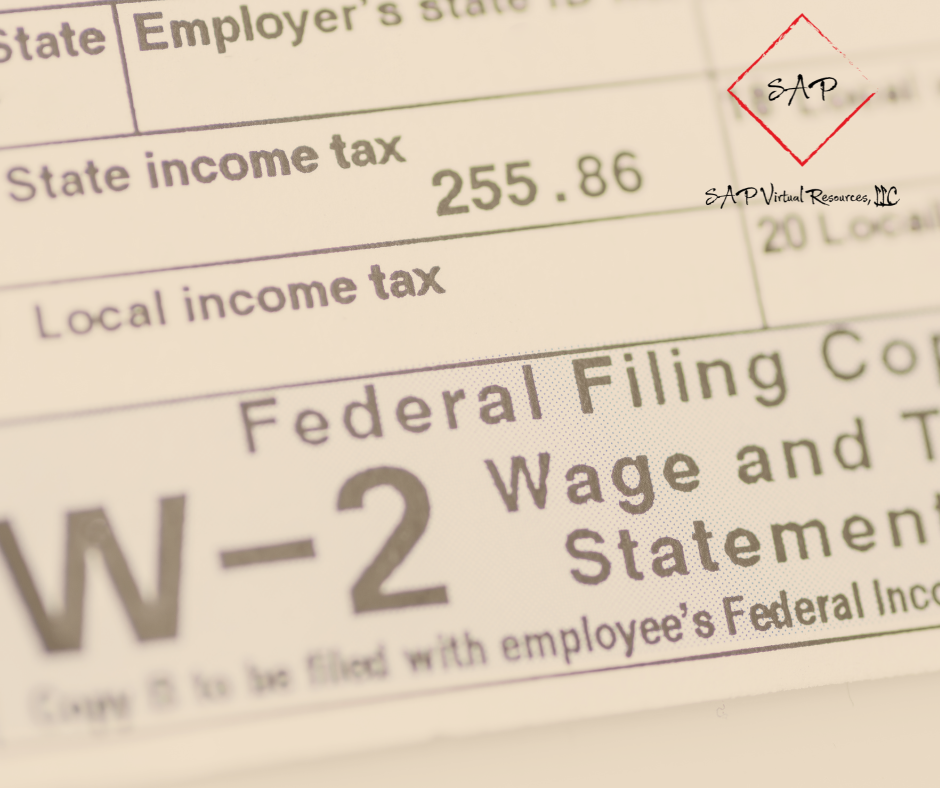Whether you hire employees or freelancers for your business, you must file W-2s and 1099s regularly. It may not be an exciting topic, but it is crucial to your bottom line. Missing deadlines or filing incorrect forms can lead to hefty penalties.
Doing payroll is the adult equivalent of a high school math class – you know it’s important but tedious. You start enthusiastically, thinking it’s a quick job, but distractions arise and fires need to be put out. only to be distracted by putting out fires in your business. In the end, organizing the supply closet sounds like an exciting adventure compared to deciphering payroll forms!
The clients I work with file W-2s, 1099-NECs, or 1099-MISCs. Each form has a different purpose and covers various types of payments.
W-2 (Wage and Tax Statement)
This form reports wages paid to employees and the taxes withheld from those wages during the calendar year.
Must be issued for all employees who have been paid a salary, wage, or other form of compensation.
Used to report:
- Gross wages, salaries, and tips.
- Federal income tax withheld.
- Social Security tax withheld.
- Medicare tax withheld.
- State and local income tax withheld.
- Employee contributions to retirement plans.
This form must be provided to the employee by January 31st.
It must be filed with the Social Security Administration by January 31st, either electronically or on paper.
1099-NEC (Nonemployee Compensation)
The IRS re-implemented this form in 2020, which hadn’t been used since the 1980s. I discussed this form in more depth in a previous blog post.
This form reports payments made to non-employees, such as independent contractors, freelancers, and self-employed individuals, for services performed.
Must be filed for a nonemployee who received payments of $600 or more in a calendar year.
They are used for payments for services performed and commissions, fees, prizes, awards, or other compensation for services.
Must be filed with the IRS and provided to the recipient by January 31st.
1099-MISC (Miscellaneous Income)
On this form, you report income other than wages, salaries, and tips that you report on your W-2 form.
Must be filed to report payments of $600 or more in a calendar year for most types of payments. However, different thresholds apply for certain payments. (Example: Report royalties of $10 or more.)
Common uses:
- Rent payments
- Royalties
- Prizes and awards that are not for services performed
- Payments to Attorneys
- Other income payments
- Medical and healthcare payments
- Crop insurance proceeds
- Payments for fishing boat proceeds
- Section 409A deferrals
This form must be provided to the recipient by January 31st. If filed electronically, the filing deadline to the IRS is March 31st, and the filing deadline for paper filing is February 28th.
Penalties: Yikes!
Missing deadlines for W-2s and 1099s can be costly. The penalties range from $50 to $270 per form, depending on how late you file.
In order to avoid penalties, start with accuracy. Double-check critical details like Social Security numbers, addresses, and income amounts. Cross-reference your payroll records with the forms before filing to ensure everything matches up.
Online Filing: Get Tech-Savvy
If you’re filing more than ten forms, it’s time to embrace technology. Register with the IRS’s Information Returns Intake System (IRIS) for streamlined electronic filing. Remember, you can’t just print forms from the IRS website as they require special ink and paper.
Common Mistakes to Avoid
- Incorrect Information: Ensure all data, especially Social Security numbers and income amounts, are correct.
- Missing Deadlines: Mark your calendar and set reminders to meet all filing deadlines.
- Inadequate Records: Keep thorough payroll records to back up the information on your forms.
- Failure to Register for E-Filing: Register with the IRS for electronic filing if required.
Helpful Resources
- IRS Website: For the latest updates and detailed filing instructions, visit irs.gov.
- Social Security Administration: For W-2 filing guidelines, check out the SSA’s employer page.
Knowing the deadlines, understanding penalties, and embracing electronic filing rules can make handling W-2s and 1099s easier. Stay organized, focused, and proactive to keep your business tax-compliant and stress-free.
Let’s be honest – you didn’t start your business to get buried in bookkeeping and payroll paperwork, right? Let’s chat if managing your bookkeeping feels like trying to herd cats! Schedule a consultation call with me, and we’ll explore how to work together.


Trackbacks/Pingbacks